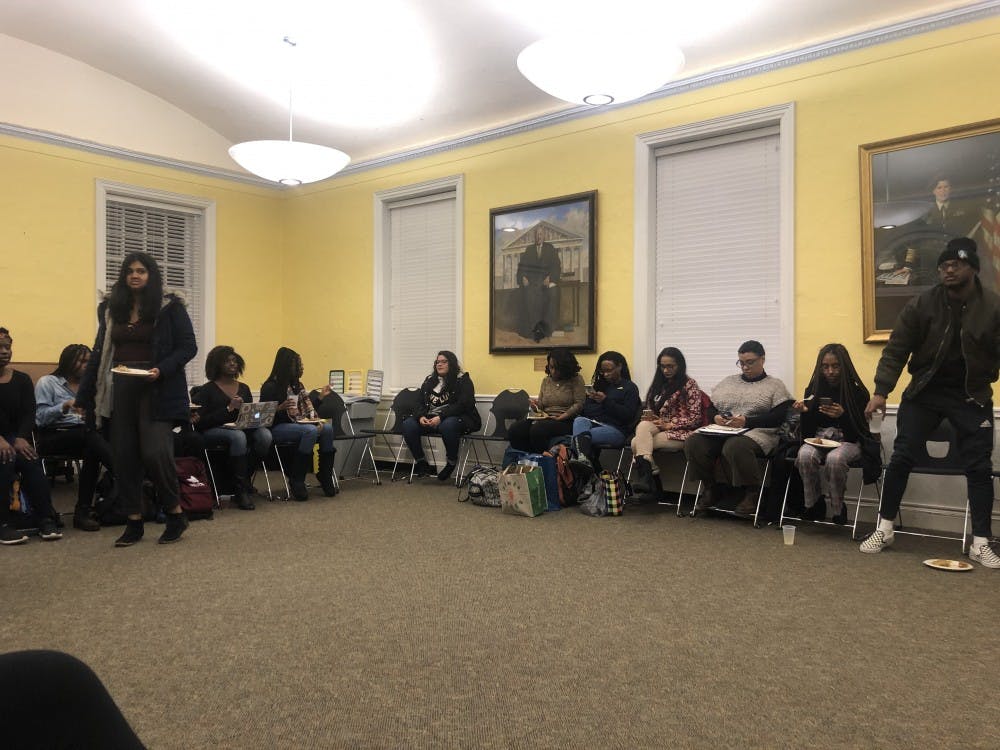Four student organizations — Hopkins Organization for Pre-Health Education (HOPE), Female Leaders of Color (FLOC), Organización Latina Estudiantil (OLÉ) and Hopkins Feminists (HopFems) — co-hosted a panel discussion on minority mental health on Friday.
The panelists were Bloomberg School of Public Health Professor Renee Johnson; Counseling Center Coordinator for Services for Black Students Leslie Leathers; Counseling Center Intern Elizabeth Cook; and Counseling Center Director of Training Durriya Meer.
Johnson began the conversation by discussing what it means to properly address mental health.
“We all have everyday stress — everybody in the world has stress,” she said. “What makes the people in this room possibly a little unique is the added environmental insults that come with being ‘othered.’”
Johnson spoke further about coping with mental health in an academic institution where students attempt to overachieve and how this culture can lead to students to improperly take care of themselves.
“It’s a regular process of maintenance,” Johnson said. ”You’ve got to keep working at it every day. It’s difficult and it’s important to put a lot into yourself.”
Leathers also touched upon the importance of taking care of other aspects of oneself. For example, Leathers explained that for some students, spiritual, social and physical health can contribute to improving mental health.
Leathers addressed some concerns about stigma related to seeking therapy. To remedy this, she encouraged students to be open and honest about their own struggles with their mental health.
“If you would go see a therapist, you could tell a friend of yours if you’re trying to encourage them to go,” she said. “That helps demystify the process. It might make it seem like less of a scary endeavor.”
Cook also acknowledged the fact that improving mental health means acknowledging the fact that one’s feelings are valid. She stressed the importance of disregarding other people’s opinions about a private problem that may lead someone to believe that they are overreacting or being too sensitive.
Addressing the problem of creating boundaries, Meer spoke about how women of color may work extra hard to be fulfill societal expectations and in the process do not get a chance to acknowledge their own accomplishments.
“Mental health is not just about recognizing parts of yourself. It’s also being able to set boundaries about things that you cannot or will not do,” Meer said.
Johnson supported Meer’s point about boundaries and their importance. She used a metaphor of an emergency plane landing to represent the necessity of putting oneself first in certain situations.
“You’re not unlimited. There’s not unlimited oxygen, and if you can’t breathe then you can’t take care of anyone else,” Johnson said.
Meer shifted the conversation to address how communities may marginalize mental health issues. She stated that each community defines and stigmatizes these issues differently but that many people may trivialize mental health struggles.
“Mental health is often confused with ‘Oh, you have to be crazy,’ or you literally have to have blue horns sticking out of your head to recognize that there is a problem,” she said.
Along the same lines, Cook spoke about how seeking help may cause people to feel judged.
“If it’s known that I am [depressed or anxious] or what have you, that will seem like another flaw against me,” Cook said.
Johnson further encouraged women of minority groups to support each other and create a community together. Specifically, she pointed out that some members of the LGBTQ community may not immediately find support and resources.
“It’s particularly hard when you really need the support of your social, racial or ethnic group in a university but you don’t get it because you’re queer or because you’re trans,” Johnson said.
Johnson also said that encouraging men to seek help for mental health problems is important.
“All of us, in our beloved community, should help men,” Johnson said. “Men in particular sometimes don’t realize what they’ve been through, and we can all pay particular attention to that.”
As the event approached its end, the panelists discussed on-campus resources for students seeking help. They recommended the Counseling Center, online resources on their website, the Sexual Assault Resource Unit, the Interfaith Center, A Place to Talk (APTT) and apps like Calm.
In an email to The News-Letter freshman Isabel Lardner, an executive board member of Hopkins Feminists, wrote that the event provided an opportunity for attendees to participate in difficult conversations.
“I thought the point brought up at the end — that instead of enjoying a Friday evening with friends, we’re having an intellectual discussion about mental health — was both ironic and sobering,” she wrote.
Lardner also reflected on the importance of learning about different perspectives on mental health.
“I can’t speak from the perspective of a racial or ethnic minority, but the intersectionality of events like these help me get out of my own head and try to understand what other people are facing as well, which is hugely important for being an ally,” Lardner wrote.
Sophomore Daniella Asafu-Adjaye, a member of HOPE, was excited that there was a large turnout for the event.
“I was a little nervous that we wouldn’t have a lot of people come, but we had over 50 people overall,” Asafu-Adjaye said.
Sophomore Shalini Vijayekumar, a member of Hopkins Feminists, said that the format of the event was designed to ensure that all attendees were comfortable.
“It’s important to reach more people, but we wanted to create a discussion type of environment,” she said. “Our goal is to have a smaller environment where people don’t feel pressured to speak up.”
Freshman FLOC representative Mya Thomas appreciated that the panel was geared toward a diverse audience so that students of many backgrounds could feel represented.
“I thought it was good that they talked about mental health in South-Asian families, black families and all sorts of different groups,” Thomas said.





